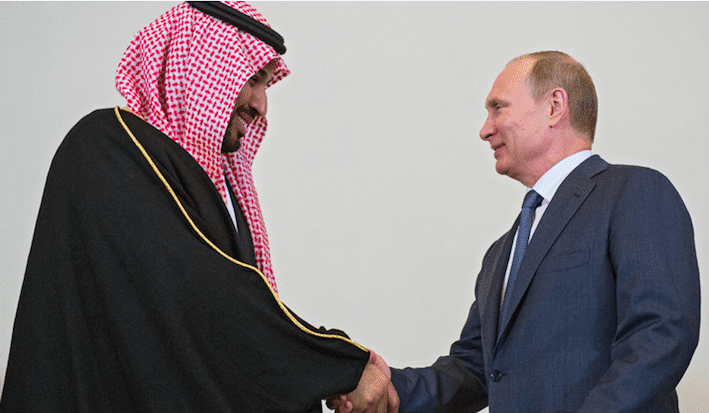Prince Muhammad’s visit to Russia will increase speculation that Saudi Arabia’s relationship with the United States is changing.
![]()
On June 17, Saudi deputy crown prince and defense minister Muhammad bin Salman (a.k.a. MbS) arrived in Russia to meet with President Vladimir Putin. The visit, which was kept secret until a few hours before he left the kingdom, follows a series of recent communications between Putin and the prince’s father, King Salman. In April, the two spoke by telephone, and on May 27, a Russian special envoy met with the king the day before the new Saudi ambassador presented his credentials in Moscow. Speaking this week, the Saudi envoy spoke of the “deeply rooted historical ties and the permanent evolution” of the relationship between the two countries.
In reality, bilateral relations have been awkward if not antagonistic. King Salman’s father, King Abdulaziz, loathed “godless communists” and broke diplomatic relations with the Soviet Union in 1938. It was not until 1992 — after the Red Army’s defeat in Afghanistan at the hands of Saudi-backed mujahedin fighters and the subsequent collapse of the Soviet Union — that ties with Moscow were reestablished.
Given MbS’s growing prominence at home and his obvious closeness to his father — who seems to use him as a special envoy in addition to his other responsibilities — the possibility of significant upgrades to the Saudi-Russian relationship seems likely. Under King Abdullah, who died in January, ties were vexed by Moscow’s support for Bashar al-Assad’s regime in Syria. Former Saudi intelligence chief Prince Bandar bin Sultan visited Russia at least twice but failed to change Putin’s mind about backing Damascus.
The Saudi Royal Court’s official statement announcing MbS’s trip described it as an opportunity “to discuss relations and aspects of cooperation between the two friendly countries.” The agenda likely includes oil, a sector in which the prince has become a key decisionmaker. Saudi determination to retain market share even at the cost of lower revenues has hit Russia hard. For his part, Putin will want to further widen differences between Riyadh and Washington on the wisdom of a nuclear deal with Iran.
After the recent Camp David meeting, President Obama described MbS — who may only be twenty-nine years old — as “wise beyond his years.” The established Washington view is that the bilateral relationship is safe because of the administration’s closeness with Crown Prince Muhammad bin Nayef (a.k.a. MbN) and new foreign minister Adel al-Jubeir, formerly the ambassador to the United States. But the king seems to favor his son over MbN, and it is likely significant that Jubeir was not sent on the Russia trip. Whatever MbS returns home with, it may prove important to the future of the U.S.-Saudi relationship.
******************************
Simon Henderson is the Baker Fellow and director of the Gulf and Energy Policy Program at The Washington Institute.


